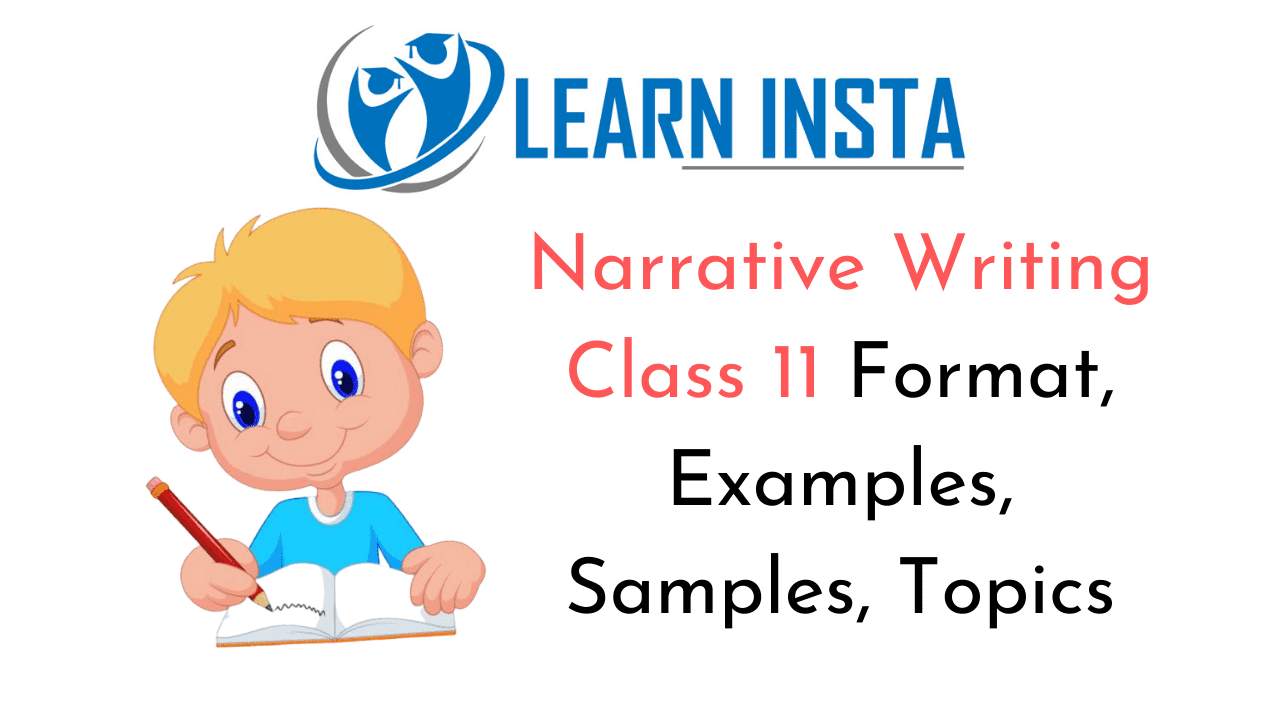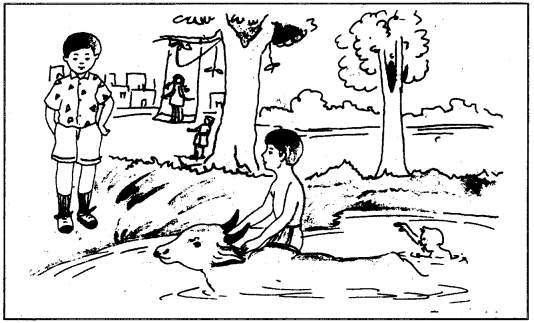
Generally, a narrative is a written or oral form of expression. It involves details of an event, experience or happening in a person’s life. Literary forms such as novels and short stories are explicit narratives told by the narrator. The narrative informs the reader about events and character and sustains the reader’s interest in the pieces.
This grammar section explains English Grammar in a clear and simple way. There are example sentences to show how the language is used. Students can also read NCERT Solutions for Class 11 English to get good marks in CBSE Board Exams.
Narrative Writing Class 11 Format, Examples, Samples, Topics
Question 1.
During the summer vacation, you visited your grandfather who lives in his native village. It was a very pleasant yet unusual experience for you. Look at the picture given below and write about this and other such experiences. You may/may not use the suggestion, given with the picture. Your composition should be in 150-200 words. Write in the first person.

| One day when you reached the pond, you found it occupied by buffaloes. Their owner, a boy, a little older than you, sat on the back of one of his animals. When the boy saw you staring at him, he smiled, showing gleaming white teeth. He invited you into the water for a swim. You told him you did not know how to swim, and he offered to teach you how to swim. |
Answer:
Swimming Lessons
My last visit to a village was when I was about ten years old. I had gone to meet my grandfather. In the beginning, I found everything strange- the cows and buffaloes living so close to us. Later, I loved to ride my grandfather’s tractor. The adventure really began when I met Chandu. That day I had gone to the village pond hoping to do some fishing. Instead, I found it occupied by buffaloes. A boy, a little older than me, was sitting on the back of one of the buffaloes. He smiled, and asked me to join him for a swim. I refused to swim with buffaloes. He laughed and jumped off and took me to the river bank. I splashed about near the shore, while he went into deep water and came back shining with diamond droplets. In a few days, I was swimming quite well and was tanned brown. My parents liked the healthy look on my face.
XYZ
Question 2.
I was walking in Bradley Woods with my dog Bruno.
Suddenly, turning a corner, I ran into a woman who appeared to be searching for someone.
“Did you see my Nicky?” she asked. “He’s about three.”
“No, I’m sorry. I didn’t see any children about.”
She grabbed my arm. “And the horsemen?”
“Horsemen? In this day and age?” I said, trying to pull away.
I saw Bruno looking at the woman with terror, his tail between his legs.
“Hey! Are you okay?” I looked up to see a man standing near me.
I mumbled, “There was this woman here…looking for her son…talking of horsemen…”
“You seem to have met the Ghost of Bradley Woods.”
And this is what he told me…
There was a soldier who lived in a cottage in Bradley Woods.
He had a beautiful wife and baby. One day, he left to fight in a war and never returned.
The enemy soldiers came from across the river, brutally assaulted her, took the baby and rode off! She died of a broken heart.
From that day on, her ghostly figure was seen wandering in the woods. I stood rooted to the spot in shock and fear.
Complete the following narrative on:
Traveling by a State-owned City Bus
Traveling by a state-owned city bus in India is an experience only the brave wish to repeat. The buses are (a) ……………………. and the frequency of bus service is erratic. The drivers and conductor are (b) ……………………. as they do not bother to stop the buses at the assigned bus – stop. Thus they cause unnecessary discomfort to the commuters. City buses, being the cheapest mode of travel are (c) ……………………. . Due to passengers constantly moving from the back gate to the front, (d) …………………… . The crowded buses are a haven for pickpockets and eve-teasers who (e) ……………………. . Thus traveling in a state-owned city bus is an ordeal one is not likely to forget in a hurry.
Answer:
(a) old, dirty and ill-maintained
(b) rude and discourteous and often cause unnecessary discomfort to the travelers
(c) often over-crowded with ladies and old people standing in the aisle
(d) the toes of those standing and traveling are often trampled upon
(e) carry on their activities without fear
Hints:
- carry on their activities without fear
- old, dirty and ill-maintained
- rude and discourteous and often cause unnecessary discomfort to the travelers
- often overcrowded with ladies and old people standing in the aisle
- the toes of those standing and traveling are often trampled upon
Question 3.
Look at the input given below:
| Floods in UP – heavy rain – breach in dam – large tracts inundated – standing crops devastated – relief operations – army – NGO’s – camp for flood victims. |
As part of the NSS, you visited the flood relief camps. Using the above input, write a description in 150-200 words. You are Ajay/Anita Khurana.
Flood Relief Camp
by Ajay
The tragedy of the devastating floods in our region hit me hard when I visited the camps run by a local NGO. It provided help and relief to the flood victims. I visited the camp with the NSS team from our college.
Heavy rains led to a breach in a dam on Gandak river in eastern UP. As a result, several villages were inundated. Villagers lost their homes; standing crops were destroyed. Their cattle were washed away. Several people went missing. Those who survived were in a miserable shape. As soon as the weather permitted, the army brought the survivors to these relief camps.
I saw the misery and hopelessness in the eyes of the flood victims. Farmers, labourers, men who lived with dignity were now reduced to being beggars. Poverty started in their face and diseases were ready to pounce on the unfortunate. The plight of the children was the most tragic of all. They were confused and frightened, having lost the battle of life before it began.